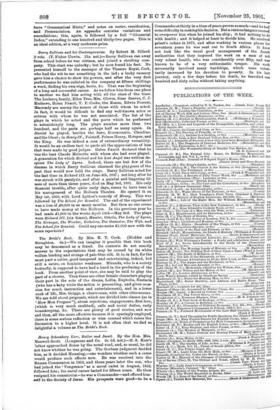Barry Sullivan and his Contemporaries. By Robert M. Sillard. 2
vols. (T. Fisher Unwin. 21s. net.)—Barry Sullivan ran away from school before he was sixteen, and joined a strolling com- pany. This start was unlucky; but he soon found his feet. He presented himself to the manager of the Theatre Royal, Cork, who had the wit to see something in the lad ; a lucky vacancy gave him a chance to show his powers, and after the very first performance he was enlisted in the company at fifteen shillings a week, finding his own wigs, boots, &c. That was the beginning of a long and successful career. As we follow him from one place to another we find him acting with all the stars of the time. The Leclercq family, Ellen Tree, Mrs. Glover, Sims Reeves, C. J. Mathews, Helen Faucit, T. P. Cooke, the Keane, Edwin Forrest, Macready are among the names of those with whom he acted. In fact, it would be difficult to find any well-known actor or actress with whom he was not associated. The list of the plays in which he acted and the parts which he performed is astonishingly long. The plays number more than two hundred, and the parts are perhaps half as many again. In Hamlet he played, besides the hero, Resencrantz, Claudius, and the Ghost ; in Henry IV., Falstaff, Prince Henry, Hotspur, and the King. He was indeed a man of extraordinary versatility. It would be an endless task to quote all the appreciations of him that were made by good judges. Helen Faucit declared that he WRS the best Claude Melnotte with whom she had ever played. A generation for which Michael and his Lost Angel was written de- spises The Lady of Lyons. Indeed, there are but few of the dramas in which Barry Sullivan charmed the playgoers of the past that would now hold the stage. Barry Sullivan acted for the last time in Richard III. on June 4th, 1887; not long after he was struck with paralysis, and after a painful and lingering ill- ness of more than three years, died on May 3rd, 1891. His only financial trouble, after quite early days, seems to have been in his management of the Holborn Theatre. He opened it on May 1st, 1869, with Lord Lytton's comedy of Money. This was followed by The School for Scandal. The end of the experiment was a loss of £8,000 in as many months. But then no one seems to have made money at the Holborn. In the previous year he had made £1,000 in the weeks April 14th—May 3rd. The plays were Richard III. (six times), Hamlet, Othello, The Lady of Lyons, The Stranger, The Wonder, Richelieu, The Gamester, The Wife, and The School for Scandal. Could any one make £1,000 now with the same repertoire?










































 Previous page
Previous page